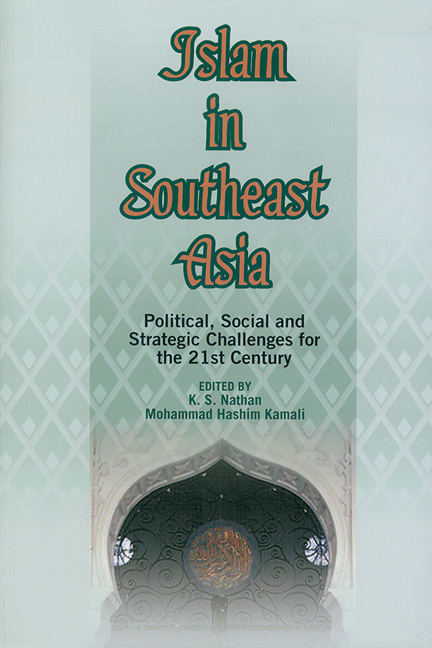Book contents
- Frontmatter
- Contents
- Preface
- Introduction: Understanding Political Islam Post-September 11
- PART ONE ISLAMIC DOCTRINE, HISTORY, GROWTH AND INSTITUTIONS IN SOUTHEAST ASIA
- 1 Islamic Thought: Theory, Concepts, and Doctrines in the Context of Southeast Asian Islam
- 2 The History of Islam in Southeast Asia: Some Questions and Debates
- 3 The Advent and Growth of Islam in the Philippines
- 4 Islamic Economic Institutions in Indonesia: A Religio-Political Perspective
- 5 The Development and Impact of Islamic Economic Institutions: The Malaysian Experience
- PART TWO POLITICS, GOVERNANCE, CIVIL SOCIETY AND GENDER ISSUES IN SOUTHEAST ASIAN ISLAM
- PART THREE MODERNIZATION, GLOBALIZATION AND THE ‘ISLAMIC STATE’ DEBATE IN SOUTHEAST ASIA
- PART FOUR IMPACT OF SEPTEMBER 11 ON ISLAMIC THOUGHT AND PRACTICE
- CONCLUSION: Addressing the Challenge of Political Islam in Southeast Asia
- Note on Contributors
- About the Editors
- Index
5 - The Development and Impact of Islamic Economic Institutions: The Malaysian Experience
from PART ONE - ISLAMIC DOCTRINE, HISTORY, GROWTH AND INSTITUTIONS IN SOUTHEAST ASIA
Published online by Cambridge University Press: 03 November 2017
- Frontmatter
- Contents
- Preface
- Introduction: Understanding Political Islam Post-September 11
- PART ONE ISLAMIC DOCTRINE, HISTORY, GROWTH AND INSTITUTIONS IN SOUTHEAST ASIA
- 1 Islamic Thought: Theory, Concepts, and Doctrines in the Context of Southeast Asian Islam
- 2 The History of Islam in Southeast Asia: Some Questions and Debates
- 3 The Advent and Growth of Islam in the Philippines
- 4 Islamic Economic Institutions in Indonesia: A Religio-Political Perspective
- 5 The Development and Impact of Islamic Economic Institutions: The Malaysian Experience
- PART TWO POLITICS, GOVERNANCE, CIVIL SOCIETY AND GENDER ISSUES IN SOUTHEAST ASIAN ISLAM
- PART THREE MODERNIZATION, GLOBALIZATION AND THE ‘ISLAMIC STATE’ DEBATE IN SOUTHEAST ASIA
- PART FOUR IMPACT OF SEPTEMBER 11 ON ISLAMIC THOUGHT AND PRACTICE
- CONCLUSION: Addressing the Challenge of Political Islam in Southeast Asia
- Note on Contributors
- About the Editors
- Index
Summary
If some have questioned whether Islam and modernity are compatible and warned of a clash of civilizations between Islam and the west, Malaysia is a Muslim nation that deflates such facile stereotypes. It has simultaneously emphasized its Muslim identity and promoted pluralism. (John Esposito, Asiaweek, 4 April 1997)
INTRODUCTION
The need for development programmes after political independence and the perceived failures of both the capitalist and socialist models provided a fresh opportunity for Muslim nations to seek “indigenous solutions” to their socioeconomic problems. The main focus is on events in the last twenty-five years where actual policy documents are available and institutions established. This chapter* argues that the development of Islamic economic institutions has been due to both external and internal factors and that both Islamic legacy and modern economics have contributed to these institutions. The chapter will also argue that the developments of these institutions and related reforms in Malaysia have by and large been accommodating, flexible and relatively pluralist in nature. In this context, “Islamization” of modern economics has been the basis of the efforts in Malaysia rather than mere rejection of modern economics or attempts to impose traditional models and views that may not necessarily be relevant in the Southeast Asian context. The chapter also attempts to evaluate the impact of Islamic economic institutions on economic development in Malaysia. Financial statistics and figures may show that the impact has thus far been marginal. However, the chapter will also argue that Islam was actually mobilized by the Mahathir administration to try and provide a counter-balance to the increasing pace of economic/material development in the last two decades, especially among the Malays. Unfortunately, not much attention has been given to this important dimension in development studies in Malaysia.
THE MODERNIZATION THESIS AND ECONOMIC DEVELOPMENT IN SOUTHEAST ASIA: A ROLE FOR RELIGION?
In his 1968 article in the International Encyclopedia of Social Sciences, Lerner (1968) characterized modernization as a process in which less developed countries acquired the characteristics of developed countries. Among these characteristics was the diffusion of secular norms2 including personality transformation. The secular mind was seen as an important “attitudinal” ingredient in modernization, being rational and progressive as opposed to the irrationality of religious (and mythical/magical) predispositions.
- Type
- Chapter
- Information
- Islam in Southeast AsiaPolitical, Social and Strategic Challenges for the 21st Century, pp. 82 - 100Publisher: ISEAS–Yusof Ishak InstitutePrint publication year: 2005



